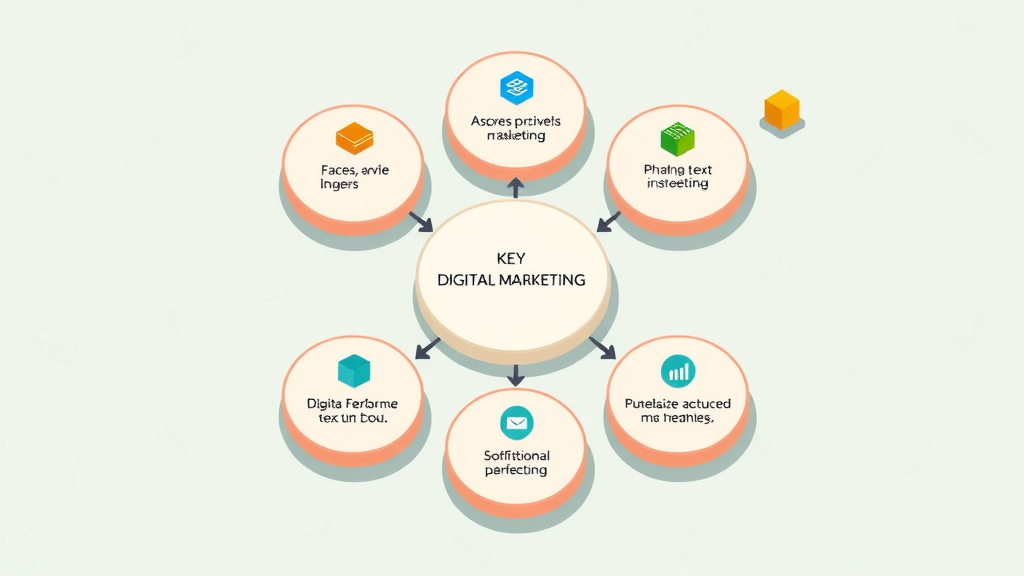Startlingly, over 60% of small businesses struggle to achieve effective digital marketing results within their first year, facing numerous hurdles that impede growth and visibility. Navigating digital marketing challenges for small businesses can feel overwhelming, especially when budgets are tight, expertise is scarce, and outcomes appear uncertain. This comprehensive guide offers actionable insights and expert advice from Joe Cardilino of Green Zaprr Group to help small business owners not only understand these challenges but also conquer them confidently.
Startling Facts About Digital Marketing Challenges for Small Businesses

Recent studies reveal that a significant number of small businesses find themselves stalled by common pain points such as limited budgets, lack of specialized knowledge, and difficulty measuring the true impact of their digital marketing investments. These hurdles collectively stunt growth and hamper the ability to attract and retain customers in competitive online marketplaces.
Understanding these startling statistics empowers small businesses to focus their limited resources strategically, ensuring that every digital marketing dollar and effort translates into measurable results. Awareness is the first step toward creating tailored solutions that drive success, just as Joe Cardilino, of Green Zaprr Group, emphasizes: "If you help enough people get what they want, you will get what you want." This mindset shifts the approach from mere tactics to creating value-driven relationships online.
Understanding Digital Marketing Challenges for Small Businesses: An Overview
"If you help enough people get what they want, you will get what you want." – Joe Cardilino, of Green Zaprr Group, emphasizing the mindset needed to tackle digital marketing challenges effectively.
Common Marketing Challenges Small Business Owners Face
- Limited marketing budget and resource allocation
- Lack of in-house digital marketing expertise
- Difficulty measuring return on investment (ROI)
- Building trust and credibility online
- Customization and scalability of marketing strategies

Small business owners frequently encounter a daunting list of obstacles when venturing into digital marketing. Budget limitations force them to make tough decisions about where and how to allocate funds. Often, these businesses lack a dedicated digital marketing team, which leads to gaps in strategy and execution. This absence of expertise not only complicates campaign development but also impacts the ability to accurately track and measure results, leading to uncertainty about marketing ROI.
Additionally, cultivating online trust requires consistent messaging and customer engagement—activities that are time-consuming and require skillful communication. Scalability presents another layer of difficulty: strategies that work for smaller operations may not translate well as the business expands, necessitating a flexible and customized approach to digital marketing planning. Recognizing these challenges upfront allows business owners to seek the right solutions and partners tailored to their unique needs.
Identifying Your Target Audience to Overcome Digital Marketing Challenges
How Knowing Your Target Audience Helps Small Business Owners

Deep knowledge of your target audience stands at the core of any effective digital marketing strategy. By identifying precise demographic and psychographic characteristics—such as age groups, interests, purchasing behaviors, and pain points—small business owners can tailor marketing campaigns that resonate deeply with those most likely to convert into loyal customers.
Joe Cardilino from Green Zaprr Group highlights, “Understanding your audience is the blueprint to customizing messages that build trust and foster engagement.” This targeted approach conserves limited marketing budgets by focusing efforts on high-value prospects rather than broad, generic outreach. Moreover, clear audience insight enhances content relevancy, boosts SEO performance, and improves overall campaign ROI—key factors in overcoming digital marketing challenges for small businesses.
Top Digital Marketing Challenges for Small Businesses and How to Overcome Them
Budget Constraints and Prioritizing Marketing Efforts

Budget constraints rank among the most formidable challenges for small businesses venturing into digital marketing. Limited funds mean owners must be strategic about channel selection and campaign scope. Prioritizing marketing efforts involves concentrating on platforms and tactics with the highest potential ROI.
Joe Cardilino advises, “Start small with high-impact initiatives such as SEO and targeted social media ads, then scale gradually.” Negotiating flexible pricing packages with service providers and leveraging cost-effective tools like email marketing can stretch budgets without compromising quality. Additionally, continuous monitoring and tweaking of campaigns ensure funds are not wasted, making budget management a manageable hurdle rather than a roadblock.
Bridging the Expertise Gap with Professional Consultation and Training

Many small businesses suffer due to a lack of in-house digital marketing expertise, which results in inefficient campaign execution. Collaborating with experienced consultants or investing in staff training can fill this gap effectively. Experts bring proven strategies, current industry knowledge, and the ability to customize approaches to fit unique business needs.
Green Zaprr Group, led by Joe Cardilino, provides personalized consulting and educational services designed to empower small businesses. “Bridging the expertise gap doesn’t mean an outsourcing dependence—it’s about equipping owners and teams with the skills and confidence to manage and optimize their own marketing,” Joe notes. This approach fosters independence and long-term success, transforming digital marketing challenges into strategic advantages.
Measuring ROI Through Clear Metrics and Reporting

Accurately measuring the return on investment from digital marketing efforts is critical for validation and future planning. Small business owners often struggle with unclear or inconsistent analytics, which undermines confidence in marketing strategies and budget allocations.
Defining Key Performance Indicators (KPIs) upfront aligned with business goals—such as website traffic, lead conversions, or customer acquisition cost—facilitates transparent reporting. Joe Cardilino stresses, “Regular, data-driven reports empower businesses to see what’s working and pivot what isn’t, boosting both accountability and ROI.” Utilizing analytics tools and partnering with marketing providers who prioritize transparency ensures measurement challenges are overcome effectively.
Building Trust and Credibility with Clients

Trust and credibility form the foundation of customer relationships and ultimately influence purchasing decisions. In the digital space, trust is earned through authentic engagement, transparent communication, and social proof such as testimonials and case studies.
Small businesses can overcome skepticism by articulating clear value propositions, responding promptly to inquiries, and showcasing success stories. Joe Cardilino affirms, “Building a reputation online is a marathon, not a sprint. Consistency, customer focus, and honesty cultivate lifelong clients and referrals.” Implementing credibility-building tactics helps surmount one of the toughest digital marketing challenges for small businesses.
Customization and Scalability of Marketing Strategies

Every small business has unique goals, markets, and resources, so one-size-fits-all marketing strategies rarely succeed. Customization ensures that campaigns reflect specific audience needs and brand identity, while scalability allows strategies to expand alongside the business growth trajectory.
Joe Cardilino highlights the importance of adaptable plans: “We design marketing blueprints that evolve—modular and scalable—so businesses can invest wisely and ramp up as opportunities arise.” This flexibility addresses concerns about wasted efforts and wasted spend, positioning small businesses to handle growth without losing effectiveness or control.
Effective Digital Marketing Strategies for Small Business Owners
Content Marketing and SEO to Drive Website Traffic
Well-crafted content marketing combined with search engine optimization (SEO) remains a cornerstone for attracting organic traffic. Creating valuable, relevant content tailored to your target audience not only drives engagement but also improves rankings on search results. This dual approach ensures small businesses maximize online visibility without breaking the bank.
SEO strategies such as keyword targeting, backlink building, and technical site optimization enhance discoverability. Meanwhile, compelling blog posts, videos, and resource materials educate and inspire potential customers, guiding them along the sales funnel. Consistency and quality are key—as Joe Cardilino puts it, “Good content turns clicks into connections.”
Leveraging Social Media for Engagement and Lead Generation
Social media platforms offer dynamic opportunities to connect directly with prospects and generate leads. By understanding where audiences spend their time—whether Facebook, Instagram, LinkedIn, or others—small businesses can craft tailored posts, campaigns, and paid ads to build brand awareness and encourage interaction.
Authentic communication, responsiveness to comments, and targeted advertisements help build community and nurture prospects. Using data insights to refine messaging ensures budgets are spent efficiently. As Green Zaprr Group advises, strategic social media management is a powerful weapon against digital marketing challenges for small businesses.
Email Marketing as a Cost-Effective Communication Tool

Email marketing remains one of the most cost-effective ways to maintain customer relationships and encourage repeat business. Personalized email sequences deliver targeted offers, nurture leads, and convey valuable information directly to subscribers.
Small businesses can build segmented mailing lists to tailor messaging for different buyer personas. With proper automation and analytics, email campaigns achieve high ROI by fostering trust, driving traffic, and converting prospects. Joe Cardilino emphasizes, “Email is the quiet workhorse of digital marketing; done well, it builds loyalty and lifetime value cost-effectively.”
Expert Insights: Best Practices to Overcome Digital Marketing Challenges
Joe Cardilino, of Green Zaprr Group, explains, "A customer-centric approach combined with continuous learning and adaptability is key to thriving in the fast-evolving digital marketing landscape."
Effective digital marketing requires focus not just on tools and trends but on clients’ evolving needs. Staying agile, embracing new technologies, and continuously educating oneself and the team are essential. Moreover, partnerships with trusted consultants bring fresh perspectives and proven practices that accelerate success. Small businesses that prioritize understanding their customers and invest in ongoing improvement rise above common hurdles.
Common Objections from Small Business Owners and How to Address Them
- Concerns about pricing and budget alignment
- Questions about value and ROI
- Trust and credibility doubts
- Competitor comparisons
- Implementation and support worries
- Compatibility and integration issues
- Risk aversion and scalability concerns
- Lack of detailed information
Addressing objections early increases confidence and improves conversion rates. Transparent communication about pricing options, value delivered, and evidence of success can mitigate concerns. Offering onboarding support, testimonials, and detailed explanations about integration reduces friction. Proactively discussing scalability and risk helps customers envision long-term partnerships rather than short-term transactions.
Building a Strong Online Presence: What Small Businesses Should Expect from Their Website

A small business’s website is the cornerstone of their online presence, serving as a digital storefront and engagement hub. Owners should expect a well-designed site that combines compelling copy, captivating visuals, and clear call-to-action buttons optimized for conversions.
High usability, fast loading speeds, mobile responsiveness, and clear navigation enhance user experience. Including testimonials and social proof reinforces credibility. According to expert Joe Cardilino, "Your website must not only attract visitors but convert them into loyal customers by telling your story authentically and persuasively."
How to Schedule a Consultation and Get Started with Digital Marketing Solutions
Getting started with professional digital marketing help is straightforward. Potential clients of Green Zaprr Group can easily schedule consultations by phone, email, or using the convenient online self-scheduling link available on their website. This flexibility accommodates busy schedules and encourages prompt engagement.
During consultations, personalized business goals, budgets, and challenges are discussed thoroughly to craft customized action plans. Early collaboration lays the foundation for overcoming digital marketing challenges for small businesses effectively and efficiently.
People Also Ask: Addressing Common Questions About Digital Marketing Challenges
What are the biggest challenges for small business marketing?
The biggest challenges include limited budgets, lack of digital marketing expertise, difficulty measuring ROI, building trust online, and creating scalable, customized marketing plans that grow with the business.
What are the challenges of digital marketing?
Challenges include staying current with rapidly evolving technologies, targeting the right audiences effectively, managing multiple digital channels, measuring campaign performance, and allocating resources wisely for maximum impact.
What are the 7 C's of digital marketing?

The 7 C's commonly refer to Content, Context, Connection, Community, Communication, Commerce, and Customization – essential elements that small businesses must incorporate to build effective digital marketing strategies.
What are 5 disadvantages of digital marketing?
Common disadvantages include high competition, complexity requiring expertise, unpredictable algorithm changes, difficulty in measuring indirect impacts, and potential negative public feedback that spreads quickly online.
Key Takeaways: Overcoming Digital Marketing Challenges for Small Businesses
- Prioritize budget and focus on high-impact marketing channels
- Engage experts and invest in continuous learning
- Set clear goals and measure ROI regularly
- Build trust through transparency and social proof
- Customize and scale marketing strategies as your business grows
- Leverage content, social media, and email marketing effectively
- Address objections proactively with clear communication
| Challenge | Solution | Benefit |
|---|---|---|
| Limited Budget | Prioritize key channels, negotiate pricing | Maximized ROI with controlled spending |
| Lack of Expertise | Consult professionals, provide training | Improved strategy and execution |
| Unclear ROI | Define KPIs, request reports | Better decision-making and accountability |
| Trust Issues | Showcase testimonials, maintain transparency | Increased client confidence |
| Scalability | Plan for growth, customize solutions | Sustainable business expansion |
Conclusion: Empowering Small Business Owners to Conquer Digital Marketing Challenges
Overcoming digital marketing challenges for small businesses requires a strategic blend of knowledge, adaptability, and trust-building. By prioritizing budget, seeking expert guidance, and focusing relentlessly on customer needs, small businesses can transform obstacles into opportunities for sustainable growth.
Joe Cardilino and Green Zaprr Group exemplify how a customer-centric, data-driven approach backed by continuous learning can unlock powerful digital marketing success. With the right tools and mindset, small businesses can confidently navigate the digital landscape, maximize ROI, and cultivate lasting customer relationships in today’s competitive online environment.
Navigating the complexities of digital marketing can be daunting for small businesses, but leveraging expert insights can provide a clear path forward. The article “The 10 Biggest Digital Marketing Challenges Facing Small Businesses” from Mint Solutions offers a comprehensive overview of common obstacles such as limited budgets and lack of expertise, along with practical solutions like focusing on cost-effective methods and partnering with reliable digital agencies. ( mintsols.com ) Similarly, Constant Contact’s piece, “8 Marketing Challenges for Small Businesses,” delves into issues like small marketing teams and staying updated with trends, providing actionable advice on outsourcing tasks and consulting specialists. ( constantcontact.com ) By exploring these resources, small business owners can gain valuable strategies to overcome digital marketing challenges and drive growth.
 Add Row
Add Row  Add
Add 



Write A Comment